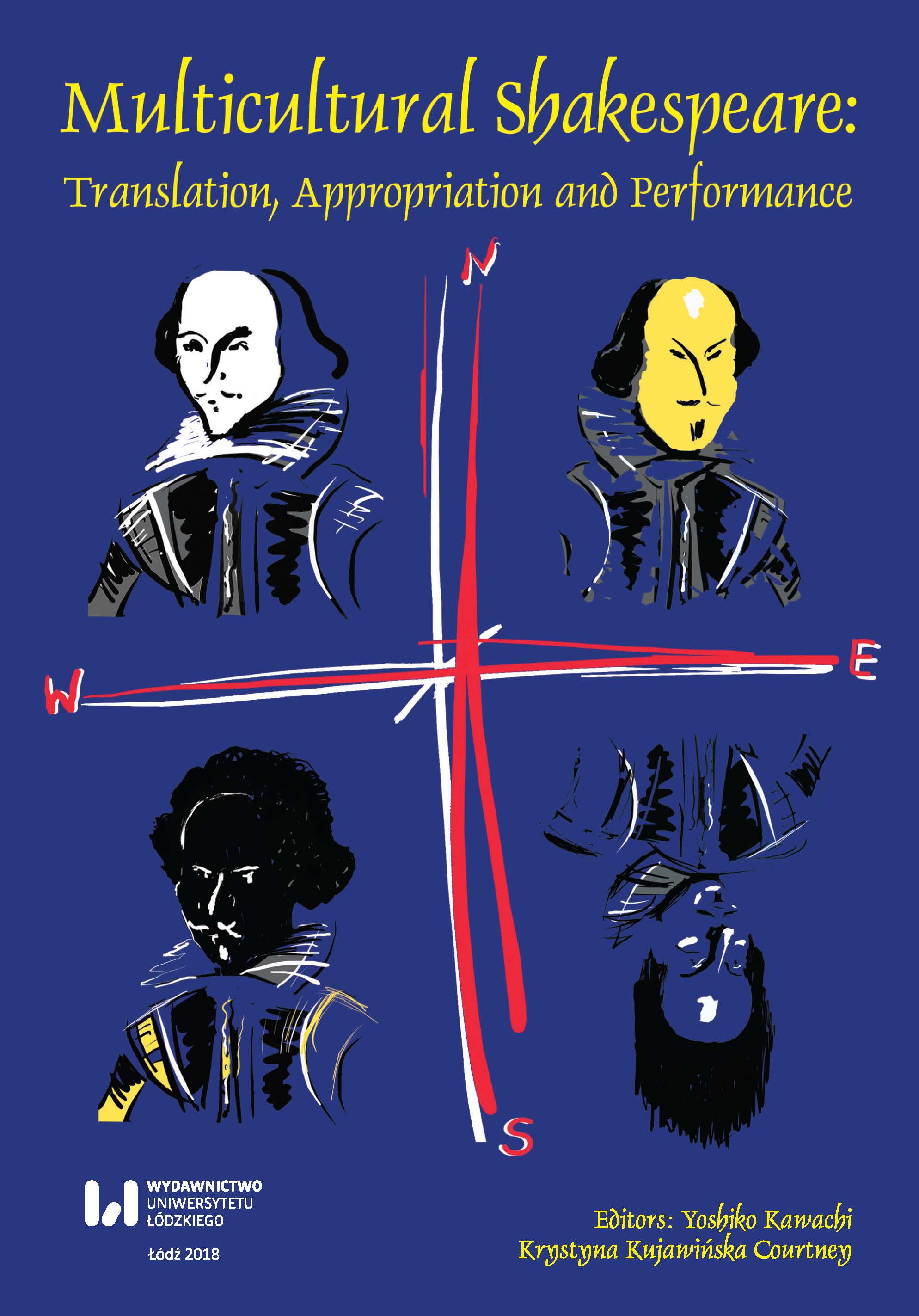Translation as Rewriting: Cultural Theoretical Appraisal of Shakespeare’s "Macbeth" in the Ewe language of West Africa
DOI:
https://doi.org/10.18778/2083-8530.18.04Słowa kluczowe:
Blege, Ewe, Macbeth, Shakespeare, translation, West AfricaAbstrakt
The cultural turn in translation theory brought attention to the idea that translation is not a purely linguistic phenomenon but one that is also constrained by culture. The cultural turn considers translation as a rewriting of an original text. In this paper, I attempt to find reflections of the cultural turn in a translation into an African language. As such, the paper reads William Shakespeare’s Macbeth in the Ewe language of West Africa, Shakespeare ʄe Makbet, as rewriting. Walter Blege is the translator and the Bureau of Ghana Languages is the publisher of the target text meant for Ewe language audience in Ghana. The target text is for learning and acquiring the Ewe language especially in the area of developing reading comprehension skills. Following Andre Lefevere and Jeremy Munday, this paper suggests that Shakespeare ʄe Makbet is a rewritten text as it follows some cultural constraints in its translation. The study provides insight into the motivations for some of the translator/rewriter’s choices. Given the less attention paid to the Ewe language and many other African languages, the paper proposes translation as a socio-psychological tool for revitalizing interest in the learning and acquisition of African and other lesser-known languages.
Pobrania
Bibliografia
Achebe, Chinua. Things Fall Apart. New York: Anchor Books, 1996.
Google Scholar
Adiku, E.T. Bumekpɔ. Accra: Bureau of Ghana Languages, 1959.
Google Scholar
Agawu, Kofi. Representing African Music: Postcolonial Notes, Queries, Positions. New York: Routledge, 2003.
Google Scholar
Agbozo, Gabriel Edzordzi. Language Choice in Ghanaian Classrooms: Linguistics Realities and Perceptions. MPhil. Thesis in English Linguistics and Language Acquisition, Norwegian University of Science and Technology, Trondheim, Norway, 2015.
Google Scholar
Akafia, Seth. Ku Le Xɔme. Accra: Bureau of Ghana Languages, 1993.
Google Scholar
Akomolafe, Femi. Focus on Africans interview with Professor Kofi Anyidoho, https://www.youtube.com/watch?v=fNVHwyynXiU Accessed: November 25, 2015.
Google Scholar
Ameko, Kwadwo. Translation Services in Ghana, https://www.modernghana.com/news/528873/translation-services-in-ghana.html Accessed: November 25, 2015.
Google Scholar
Blege, Walter. Shakespeare ʄe Makbet. Accra: Bureau of Ghana Languages, 1968.
Google Scholar
Boedeker, Debora. “Hecate: A Transfunctional Goddess in the Theogony?” Transactions of the American Philosophical Association, 113: 79-83, 1983.
Google Scholar
Bureau of Ghana Languages, http://www.ghanaculture.gov.gh/index1.php?linkid=331&page=2§ionid=602 Accessed: November 25, 2015.
Google Scholar
Catford, J.C. A linguistic theory of translation: An essay in applied linguistics. London: Oxford University Press, 1965.
Google Scholar
Darian-Smith, Eve and McCarty, Philip C. The Global Turn: Theories, Research, and Methods for Global Studies. Oakland, California: University of California Press, 2017.
Google Scholar
Eagly, Alice H. and Chaiken, Shelly. The Psychology of Attitudes. London: Harcourt-Brace College Publishers, 1993.
Google Scholar
Gentzler, Edward. Contemporary Translation Theories. Cleveland: Multilingual Matters, 2001.
Google Scholar
Ghana Education Service. Teaching Syllabus for Ghanaian Languages and Culture. Accra: Ministry of Education and Sports, 2007.
Google Scholar
Hermans, Theo. Translation in Systems: Descriptive and System-oriented Approaches Explained. Shanghai: Shanghai Foreign Language Education Press, 2004.
Google Scholar
Hermans, Theo. (ed.) The Manipulation of Literature: Studies in Literary Translation. London: Croom Helm.
Google Scholar
Igboanusi, Herbert. “Mother Tongue-Based Education in Nigeria: Attitudes and Practice.” International Journal of Bilingual Education and Bilingualism, 11(6), 2008.
Google Scholar
Lefevere, Andre. Translation, Rewriting and the Manipulation of Literary Fame. Shanghai: Shanghai Foreign Language Education Press, 2004a.
Google Scholar
Lefevere, Andre. (ed.) Translation/History/Culture: A Sourcebook. Shanghai: Shanghai Foreign Language Education Press, 2004b.
Google Scholar
Lefevere, Andre. Essays in Comparative Literature. Calcutta: Papyrus, 1989.
Google Scholar
Mieder, W. Proverbs Are Never Out of Season: Popular Wisdom in the Modern Age. New York: Oxford University Press, 1993.
Google Scholar
Munday, Jeremy. Introducing Translation Studies Theories and Applications. London and New York: Routledge, 2012.
Google Scholar
Ndamba, Gamuchirai Tsitsi. “Mother tongue usage in learning: An examination of language preferences in Zimbabwe.” Journal of Pan-African Studies, 2(4), 2008.
Google Scholar
Ngũgĩ wa Thiong’o. “The politics of translation: notes towards an African language policy”, Journal of African Cultural Studies, DOI: 10.1080/13696815.2016.1183476 2017.
Google Scholar
Nida, Eugene A. and Taber, Charles R. The Theory and Practice of Translation, Leiden: E.J. Brill, 1982.
Google Scholar
Oettinger, Anthony G. Automatic language translation: Lexical and technical aspects, with particular reference to Russian. Cambridge Mass.: Harvard University Press, 1960.
Google Scholar
Pym, Anthony. Exploring Translation Theories. New York: Routledge, 2010.
Google Scholar
Seshie, L.K.M. Akpalu ʄe Hawo. Accra: Sedco Publishing, 1991.
Google Scholar
Setsoafia, Bidi H.K. Tɔgbui Kpeglo. Accra: Bureau of Ghana Languages, 1968.
Google Scholar
Simons, Gary F. and Charles D. Fennig (eds.). Ethnologue: Languages of the World, Twenty-first edition. Dallas, Texas: SIL International. Online version: http://www.ethnologue.com Accessed: June 1, 2018.
Google Scholar
Wiegraebe, P. Eʋegbalexelxle. Hamburg: Norddeutsche Missionsgesellschaft, 1931.
Google Scholar
Pobrania
Opublikowane
Jak cytować
Numer
Dział
Licencja

Utwór dostępny jest na licencji Creative Commons Uznanie autorstwa – Użycie niekomercyjne – Bez utworów zależnych 4.0 Międzynarodowe.












